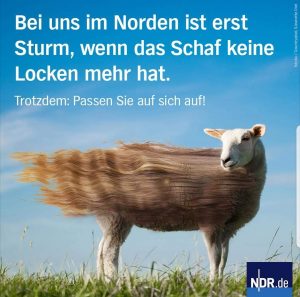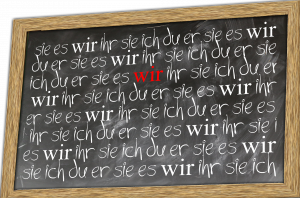Einheit 1.8 (online)
 |
 |
![]() Übung 1: Wie ist das Wetter? Work through the following activities to practice your weather vocabulary.
Übung 1: Wie ist das Wetter? Work through the following activities to practice your weather vocabulary.
Die deutschsprachigen Länder
Where is German predominantly spoken? Read through the presentation about the 4 major German-speaking countries.
![]() Grammatik
Grammatik
Conjugation of “sein” and “haben”
These two verbs are used frequently and are irregular verbs. They must be memorized!
Click to hear the verbs while you read through the charts.
| sein | to be | haben | to have |
| ich bin | I am | ich habe | I have |
| du bist | you are | du hast | you have |
| er/sie/es ist | he/she/it is | er/sie/es hat | he/she/it has |
| wir sind | we are | wir haben | we have |
| ihr seid | you are | ihr habt | you have |
| sie/Sie sind | they/you are | sie/Sie haben | they/you have |
*Achtung*
Just because we now know “I am …” or “I have …” doesn’t mean we can just translate from English into German. One of the biggest mistakes that language learners make is to think you can just translate from one language into the other.
For example: How are you? I am good.
You may want to say:
Wie bist du? Ich bin gut.
This does NOT work in German. Remember what we learned in 1.1 and 1.5:
Wie geht es dir? Mir geht es gut.
You will learn other expressions like this through out the book.
![]() Grammatik
Grammatik
Personal Pronouns
Personal Pronouns refer to the person or thing which performs the action expressed by the verb. Pronouns stand in for nouns when it is clear who is being talked about. For example, when you want to talk about a person without repeating their name, you use a personal pronoun. You have already seen all these pronouns used in sentences.
| ich (I)
du (you – informal singular) er/sie/es (he/she/it) wir (we) ihr (you – informal plural) sie (they) Sie (you – formal singular & plural) |
 |
Beispiele:
Was sprichst du? Ich spreche Englisch und Deutsch.
Joaquin kommt aus Peru. = Er kommt aus Peru.
Olena ist Ukrainerin und Kanadierin. = Sie ist Ukrainerin und Kanadierin.
![]() Übung 2
Übung 2
![]() Grammatik
Grammatik
Conjugation of Verbs (Part 1)
Here is a list of some of the verbs we have used so far in Einheit 1. Please begin to practice and memorize these verbs. Do you see a pattern? Memorize that pattern as well.
| Pronomen | kommen | wohnen |
leben |
heißen |
sprechen |
| ich | komme | wohne | lebe | heiße | spreche |
| du | kommst | wohnst | lebst | heißt | sprichst |
| er/sie/es | kommt | wohnt | lebt | heißt | spricht |
| wir | kommen | wohnen | leben | heißen | sprechen |
| ihr | kommt | wohnt | lebt | heißt | sprecht |
| sie/Sie | kommen | wohnen | leben | heißen | sprechen |
*Achtung*
The “verb stem” is the portion of the verb that remains after you remove the “en” ending in these verbs. The process of making sure that the verb and pronoun correspond is called conjugation.
![]() Übung 3. Click on the correctly conjugated verb.
Übung 3. Click on the correctly conjugated verb.
![]() Übung 4
Übung 4
![]() Wortschatz in Quizlet:
Wortschatz in Quizlet:
![]() Was wissen Sie jetzt? Klicken Sie hier für “Online Practice” 1.8.
Was wissen Sie jetzt? Klicken Sie hier für “Online Practice” 1.8.
Extra Practice (optional):
![]() Deutschtrainer
Deutschtrainer
If you want to practice vocabulary from todays lesson, click on the topic below. Watch the video and then click on “start” under the video and do the exercises.
Weather
Months & Seasons
![]() German Grammar Review
German Grammar Review
If you want extra practice on the grammar concepts learned today, click the topic below:
The verb: haben
The verb: sein
Media Attributions
- Schaf ohne Locken © NDR.de is licensed under a CC BY-NC-SA (Attribution NonCommercial ShareAlike) license
- Meersburg © ckost is licensed under a CC BY-NC-SA (Attribution NonCommercial ShareAlike) license
- star © IO-Images is licensed under a Public Domain license
- light-bulb © IO-Images is licensed under a Public Domain license
- board-1527805_1920 © Gerd Altmann is licensed under a Public Domain license
- link © IO-Images is licensed under a Public Domain license
- check mark © janjf93 adapted by Solomon Hajramezan is licensed under a Public Domain license
- play © IO-Images is licensed under a Public Domain license
to come
to live
to live
to be called
to speak

